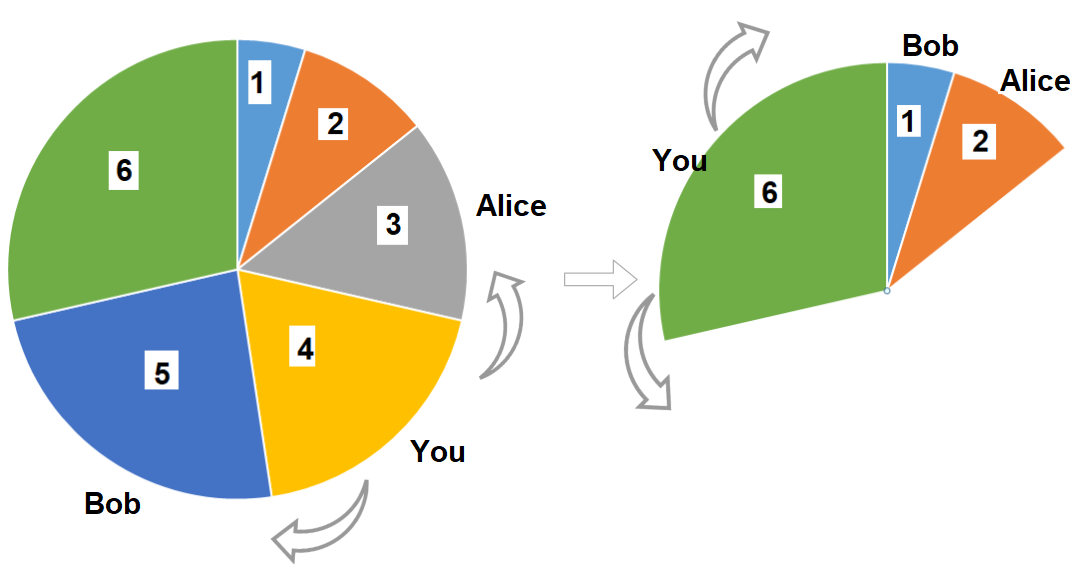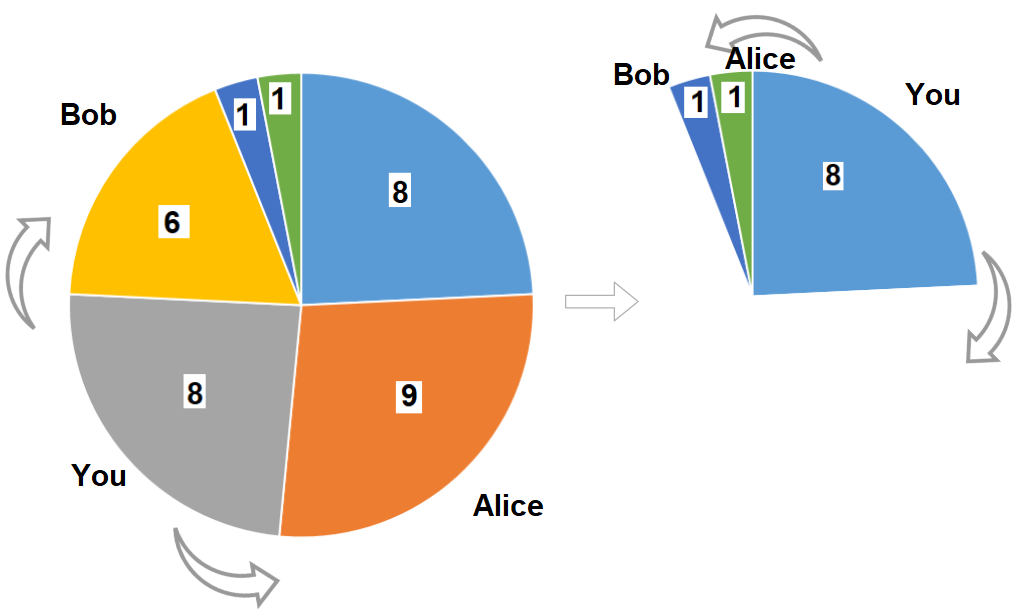Pizza With 3n Slices
There is a pizza with 3n slices of varying size, you and your friends will take slices of pizza as follows:
- You will pick any pizza slice.
- Your friend Alice will pick next slice in anti clockwise direction of your pick.
- Your friend Bob will pick next slice in clockwise direction of your pick.
- Repeat until there are no more slices of pizzas.
Sizes of Pizza slices is represented by circular array slices in clockwise direction.
Return the maximum possible sum of slice sizes which you can have.
Example 1:

Input: slices = [1,2,3,4,5,6] Output: 10 Explanation: Pick pizza slice of size 4, Alice and Bob will pick slices with size 3 and 5 respectively. Then Pick slices with size 6, finally Alice and Bob will pick slice of size 2 and 1 respectively. Total = 4 + 6.
Example 2:

Input: slices = [8,9,8,6,1,1] Output: 16 Output: Pick pizza slice of size 8 in each turn. If you pick slice with size 9 your partners will pick slices of size 8.
Example 3:
Input: slices = [4,1,2,5,8,3,1,9,7] Output: 21
Example 4:
Input: slices = [3,1,2] Output: 3
Constraints:
- 1 <= slices.length <= 500
- slices.length % 3 == 0
- 1 <= slices[i] <= 1000
Solution:
Observation
- We can understand the problem: pick n non-adjacent elements from circular array m=3n elements so that the sum of the elements is maximum.
- We can't pick 0th and (m-1)th elements at the same time, since it's adjacent in circular array.
- So there are total 2 cases, then we can return the case with maximum sum:
- Case 1: Don't pick (m-1)th element
=> Solve problem: pick n non-adjacent elements from linear array elements in ranges [0..m-2] so that the sum of the elements is maximum. - Case 2: Don't pick 0th element
=> Solve problem: pick n non-adjacent elements from linear array elements in ranges [1..m-1] so that the sum of the elements is maximum.
- Case 1: Don't pick (m-1)th element
public int maxSizeSlices(int[] slices) {
int m = slices.length, n = m / 3;
int[] slices1 = Arrays.copyOfRange(slices, 0, m-1);
int[] slices2 = Arrays.copyOfRange(slices, 1, m);
return Math.max(maxSum(slices1, n), maxSum(slices2, n));
}
int maxSum(int[] arr, int n) { // max sum when pick `n` non-adjacent elements from `arr`
int m = arr.length;
int[][] dp = new int[m+1][n+1]; // dp[i][j] is maximum sum which we pick `j` elements from linear array `i` elements
// Case j = 0 (pick 0 elements): dp[i][0] = 0
// Case i = 0 (array is empty): dp[0][j] = 0
for (int i = 1; i <= m; ++i) {
for (int j = 1; j <= n; ++j) {
if (i == 1) { // array has only 1 element
dp[i][j] = arr[0]; // pick that element
} else {
dp[i][j] = Math.max(
dp[i-1][j], // don't pick element `ith`
dp[i-2][j-1] + arr[i-1] // pick element `ith` -> dp[i-2][j-1] means choose `j-1` elements from array `i-2` elements
// because we exclude adjacent element `(i-1)th`
);
}
}
}
return dp[m][n];
}
Complexity
- Time & Space: O(m*n) ~ O(3n*n) ~ O(n^2), n is the number of slices in pizza need to pick